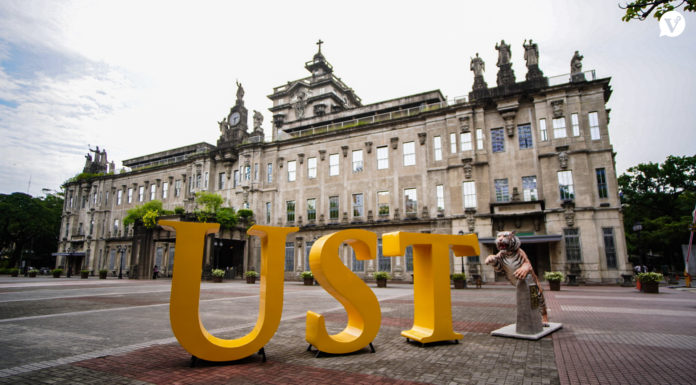 AUTOMATION was a historic first for Philippines elections last May 10, but the problems remain the same, such as vote-buying amd personality-oriented politics.
AUTOMATION was a historic first for Philippines elections last May 10, but the problems remain the same, such as vote-buying amd personality-oriented politics.
This was the the main observation of poll volunteers from the UST Santisimo Rosario Parish, who took part in the country’s first automated polls.
Fourty-three Thomasians — composed students, faculty members, and University officials — volunteered with the Parish Pastoral Council for Responsible Voting (PPCRV) and were assigned in three polling precincts – Ramon Magsaysay High School, Juan Luna High School, and the Mormon chapel on Morayta Street – of District Four in Manila.
According to Vincent Aguila, president of the Political Science Forum, 38 students from the Political Science Forum, Political Science professor Ma. Zenia Rodriguez, former Faculty of Arts and Letters Dean Prof. Belen Tangco, PPCRV coordinator of the Santisimo Rosario Parish Bro. Rolando Ingaran, PPCRV assistant coordinator Fr. Rodel Aligan, O.P., and Santisimo Rosario Parish priest, Fr. Franklin Beltran, O.P., represented the Thomasian community in helping maintain the integrity of the elections through responsible stewardship.
Aguila said that the Thomasian volunteers served as poll watchers and also assisted the voters who were unfamiliar with the use of the automated machines.
Tangco was the one who tapped the Political Science Forum to participate in the elections, to which the latter agreed to join. Beltran, on the other hand, encouraged Catholics to volunteer and participate in the election with the PPCRV, and a total 167 volunteers (Thomasian and non-Thomasians alike) responded to the call.
Election experience
The Thomasian volunteers’ experience at the polls were rife with the common problems in elections, one of which was vote buying.
“We encountered incidents like vote-buying, [so] I asked some of our volunteers to take pictures of any suspicious individuals who [did the act],” Aguila said.
He also said that they had difficulty in mobilizing volunteers since one-third of their organization was taking summer classes, forcing him to delegate people below 18-years-old and those who didn’t register to assist in their respective precincts.
People outside the precincts also kept giving away campaign paraphernalia even though such an activity is banned during the actual election.
“Some of the people outside the [polling] precincts were handing out fans with the candidate’s face on it and some were even giving away money to passersby just to take them,” he said. “We reported them to the authority.”
For most of the volunteers, it was a tough and challenging experience. But Aguila said that even though they encountered a lot of problems during their volunteering stint, they were still able to do their tasks accordingly.
On a report given by the Political Science Forum to the Varsitarian, the Political Science Forum extended their time until 2 a.m. the next day to get the election returns. They were accompanied by Bro. Rolando Ingaran.
“The Thomasian volunteers, especially the students, were very active during the election. I only paid a few visits [to] the polling precincts since we already had many volunteers and I didn’t need to worry [about] them. What I did was to prepare the food for the volunteers,” Beltran said, lauding the volunteers for their active role.
Operation CHAMP
Serving as a watchdog in the elections is no easy task. One must be mentally prepared for the demands of the job. Knowing this, the volunteers underwent training seminars in time for E-day.
“We underwent a voter’s education program for one week to prepare us in time,” Aguila said.
The training they took was in the form of a program called Operation CHAMP (or Clean, Honest, Accurate, Meaningful and Peaceful Elections) which was launched by the Catholic Bishops’ Conference of the Philippines (CBCP) last May 7 in their official website.
It aims to provide an “objective assessment of the first automated national elections in the country.” The program also allowed the public to give commentaries and to upload materials relative to the election.














